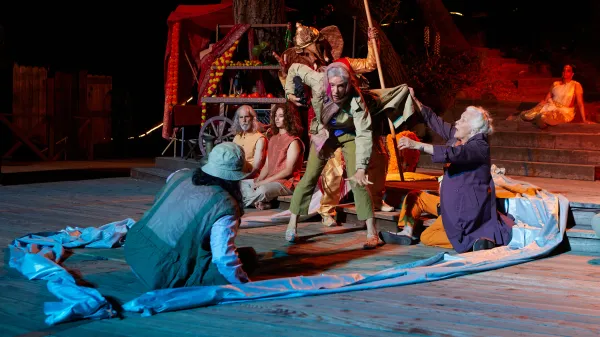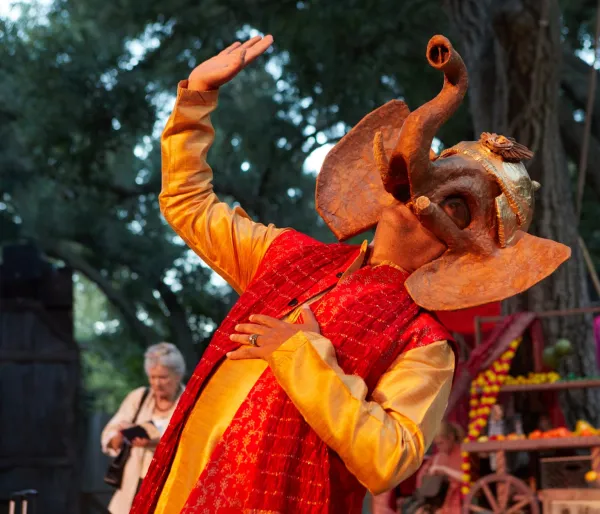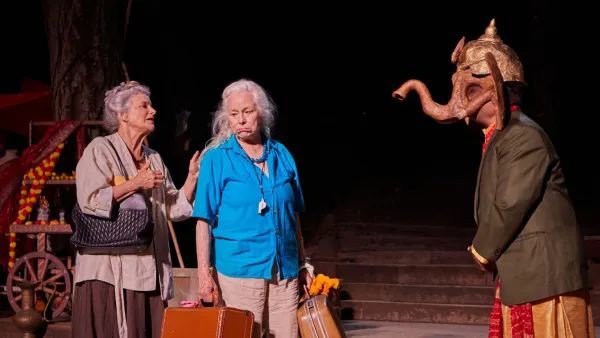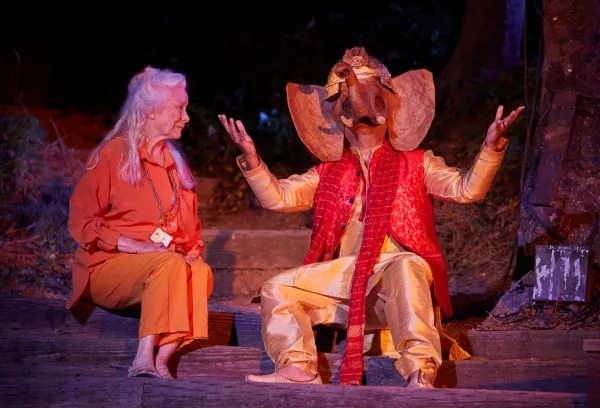Will Geer’s Theatricum Botanicum goes Bollywood, with Terrence McNally’s India-set A Perfect Ganesh, which opens with a barefoot Apsara (Shivani Thakkar) or celestial nymph in Hindu mythology, traditionally dancing onstage in age-old Indian radiant raiment. The dancer is followed by Ganesha (Mueen Jahan), the narrator wearing an elephant mask, denoting the Hindu god Ganesh, the remover of obstacles, bearer of good luck and patron of arts.
Enter two Connecticut friends, Katharine Brynne (Ellen Geer, WGTB’s Producing Artistic Director) and Margaret Civil (Melora Marshall), who are flying to the subcontinent. In doing so, the New Englanders are walking in the footsteps of characters in a well-trod genre of Westerners leaving their more “advanced,” materialistic societies to live in “exotic” cultures which are closer to nature and often endowed with a heightened spirituality. As is the case with both Katharine and Margaret, they carry pain and are on quests for a healing they yearn to find in these faraway lands. Katharine’s favorite expression, which she repeats throughout the paly, is taken from “Shakespeare’s Henry V: “O for a muse of fire.”
This literary trend, which has found its way onto stage and screen, was a vogue with writers of British ancestry. The Nobel Prize-winning British author Rudyard Kipling, who was born in Bombay, referred to this cross-cultural phenomenon as “East meets West.” His splendid novella in an 1888 collection, The Man Who Would Be King, elucidates this notion. In 1933, Lancashire-born James Hilton wrote 1933’s Lost Horizon, about a mythical utopian valley somewhere in the Himalayas. Another Brit who wrote a beautiful book in this genre is 1934’s Burmese Days, the first novel by Eric Blair (better known as none other than George Orwell).
Englishman Somerset Maugham was also an exemplar of this genre, especially in 1944’s The Razor’s Edge, wherein an American veteran traumatized by the horrors of World War I flees to India, where he studies under a guru (called Sri Ganesha) and attains enlightenment, which he brings to the West to cure members of the “Lost Generation” suffering from psychological malaise. Before writing A Clockwork Orange, during the 1950s Manchester-born Anthony Burgess penned The Malayan Trilogy. And so on.
Five-time Tony Award winner Terrence McNally has taken this tried-and-true genre and injected fresh elements of gender, age and sexual identity into what we could call “the Eastern.” Usually, the protagonists in these works are white males, generally youthful, who romance “Native” women, such as the title character in Joseph Conrad’s 1899 Lord Jim. There are exceptions, as in E.M. Forster’s 1924 A Passage to India, but most of the lead Western characters tend to be male.
In A Perfect Ganesh, both protagonists, Katharine and Margaret, are women. Furthermore, they are characters in their sixties (at least they are in this production). So, McNally’s play offers a feminist twist and agist tweaking to the usual young or middle-aged male-dominated narrative, bringing something new to the genre.
Furthermore, McNally – one of our top playwrights who wrote 1993’s Kiss of the Spider Woman, 1995’s Love! Valour! Compassion!, 1996’s Master Class and the book for 1998’s Ragtime – also inserts a gay subplot into A Perfect Ganesh, opening up the genre even more. This had rarely been explicitly done in the “Eastern” (although James Norman Hall did write about a gay character in his short story The Forgotten One, set in the South Seas and published circa 1952).
McNally pushes the genre’s envelope even more by including both a hate crime and an AIDS theme in A Perfect Ganesh, which premiered Off-Broadway in 1993, when the AIDS epidemic was still a raging threat. Rudolf Nureyev died of an AIDS-related illness that year, while Tony Kushner’s Angels in America won the Tony Award for Best Play and the Pulitzer Prize for Drama in 1993. In A Perfect Ganesh McNally uses the Indian milieu to draw parallels between AIDS and what was called leprosy, now properly known as Hansen’s Disease. Breast cancer, too, is touched upon in McNally’s play, which was a finalist for the Pulitzer Prize in 1994.
The two-act play is well-acted, spiced with humor, as Katharine and Margaret are the classic fish out of water characters, with all the comic implications that holds. (“I don’t think we’re in Connecticut anymore, Toto!”) Ganesh is adroitly directed with insight by veteran helmer Mary Jo DuPrey, with a mise-en-scene that takes her spry cast all around the amphitheater’s multi-level stage and Topanga Canyon environs (take that, proscenium arch and fourth wall!).
Offstage, Geer and Marshall – who have co-starred often at WGTB – are real life sisters, and they bring their sisterly bond to bear on the two longtime friends, as they crisscross India en route to the subcontinent’s splendor, seeking to overcome tragic losses by attaining a transcendental sense of oneness, as they come across various characters, including fellow travelers played by Rajiv Shah. While Katharine and Margaret may not experience cosmic consciousness, their friendship blossoms and deepens as a result of their expedition towards the heart of lightness.
In press notes DuPrey states: “Their journey is at once geographical and deeply internal as they wrestle with their failings as wives, mothers and friends. Through their journey, McNally incriminates the unforgiving prejudices, superficial values, emotional denials and cultural superiorities embedded in contemporary American culture that can lead to personal destruction if not tempered with insight, searing truth and compassion. At the same time, he humorously skewers the orientalist, colonialist stereotype of the Western ‘seeker’ finding solace in ‘trips to India,’ rather than simply facing themselves where they are.”
The almost three-hour play is enlivened by Shivani Thakkar’s presence and dancing, up and down the aisles and across the stage, which the colorfully clad hoofer choreographed herself, sometimes joined onstage by Simi Fulton, Emily-Mae Kamp and Liza Rash. It does not seem that the Apsara character was in McNally’s original production, and if this is the case, she and her footwork are a great touch, a welcome original addition to this gentle drama about a cross-cultural pilgrimage, crossing the Ganges towards higher consciousness – no matter what your age, gender or sexual preference are.
Will Geer’s Theatricum Botanicum is presenting A Perfect Ganesh through October 7 in repertory with Macbeth, A Midsummer Night’s Dream and Queen Margaret’s Version of Shakespeare’s War of the Roses (co-starring Melora Marshall as another, very different Margaret) at 1419 North Topanga Canyon Blvd., Topanga, California 90290. For info and tickets: 310-455-3723; https://theatricum.com/queen-margarets-version-of-shakespeares-war-of-the-roses-2/.
ALOHA OE (“Farewell to Thee”), ALAN ARKIN, unforgettable as a deaf mute named Singer in 1968’s The Heart is a Lonely Hunter and in so much more, one of the greats.






